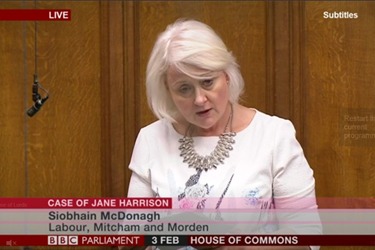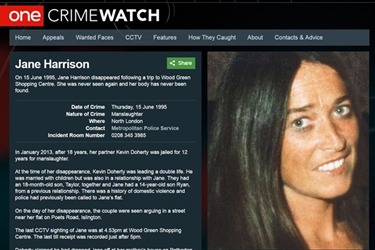
Siobhain spoke on the case of
Jane Harrison, who was murdered by her partner in 1995. It took about 15 years to bring
Kevin Doherty to justice, and he will be eligible for parole in 2018, after just six years in prison. Doherty was sentenced to 12 years for manslaughter in 2012.
Siobhain called for the introduction of '
Helen's Law', otherwise known as 'No Body, No Parole'.
You can read Siobhain's speech below and watch it here.

'Thank you Madam Deputy Speaker.
I am grateful to have the opportunity to lead this debate – and before I begin, I wish to thank my Honourable Friend, the Member for St Helen’s North, for championing ‘Helen’s Law’ in this House last year, following the tireless campaigning of Marie McCourt after her daughter Helen McCourt was murdered in 1988.
This is not a speech I would ever have wished to make.
On 15 June 1995, Ms Jane Harrison disappeared following a trip to Wood Green Shopping Centre. She was never seen again and her body has never been found. She was just 32 years old.
Jane was murdered by her jealous and controlling partner, Kevin Doherty.
Jane left behind a grieving family, devastated parents and sisters, and two young sons, then aged 14 and just eighteen-months old. I would like this House to acknowledge the presence of Jane’s family in the public gallery today. I know that the Harrisons would be very grateful for the opportunity to meet with the Minister in person to discuss their case.
The path to justice for the Harrison family has been long, and at times it has felt impossible.
In January 2013, after 18 years of heart-ache and agony for the Harrison family, Kevin Doherty was finally sentenced to 12 years in jail for manslaughter.
At the time of Jane’s murder, Doherty was leading a double life. He was married to someone else, with whom he had other children, but he was also in a relationship with Jane. Together they had a baby, and Jane also had a teenage son from a previous relationship. Doherty was a controlling partner, and had been abusive to Jane previously.
On the day of her disappearance, the couple were seen arguing near her flat on Poets Road, Islington. The last trace of Jane was at 5pm in Wood Green shopping centre, buying items for the family’s holiday to Florida. However, Doherty had already cancelled plans for the holiday without Jane knowing – because he knew they would not be going.
Doherty claimed he had later dropped Jane off at her mother’s house and that she had never returned home to him. Jane was reported missing by Doherty the following day.
It was not until 2012 that technological advances allowed for cell site analysis to be undertaken, which proved that Doherty had lied to police in 1995 when he had originally been arrested.
Doherty had claimed that Jane had called the landline at the flat twice after she disappeared. On both occasions they happened in the presence of witnesses. Call analysis in 2012 showed the calls had actually been made from Doherty’s mobile phone.
Furthermore, Doherty’s movements in the days after Jane’s disappearance did not tie in with cell site data. So what happened on 16 June 1995 remains largely unknown.
But we do know that Doherty killed Jane. No one else has ever been investigated as being connected to the case.
Doherty’s manslaughter conviction in 2012 should have provided the Harrison family with closure. But twelve years is not enough for a man who took away a loving mother, sister and daughter from her family.
At the same time, Doherty has never expressed any remorse for Jane’s murder – nor has he ever revealed the location of Jane’s body. Doherty’s final act of remorseless cruelty has meant that the Harrison family have never been able to give Jane the dignity of a funeral and a resting place. The Harrisons have never had somewhere to visit together on anniversaries; somewhere to place a bunch of flowers.
Jane’s parents, Phyllis and John, devoted their lives to searching for justice for their daughter and raising the two beloved sons she left behind. But they died before they were able to see Doherty finally being brought to justice. Jane’s sister Claire told me that it was her mother’s dying wish that Jane was found and laid to rest with her parents.
But calculated murderer Doherty has denied the family this source of closure.
So I hope the Minister can empathise with the horror the Harrisons felt, when they discovered that Doherty, the same man that not only murdered Jane but has concealed for twenty-two years where her body is, could be eligible for parole next year, six years into his twelve year sentence.
This is because the English legal system does not require a convicted murderer to admit guilt or to reveal the location of a victim’s remains before being released on parole, after their determined tariff.
It should be common sense that Kevin Doherty, like Ian Simms the murderer of Helen McCourt, should under no circumstances be eligible for applying for parole.
The law must be changed to acknowledge the suffering that Doherty has caused to the Harrison family.
Today, I wish to reaffirm support for the campaign led in parliament by my Honourable Friend, the Member for St Helen’s North.
Firstly, murderers like Doherty must be denied parole for as long as they refuse to disclose the whereabouts of their victim’s remains.
Secondly, Doherty, and those like him, must serve a full-life tariff (without option of parole or release) until the murderer discloses the location, and enables the recovery, of their victim’s remains. This must pertain regardless of their behaviour in prison.
Thirdly, as stipulated in ‘Helen’s Law’, the following rarely-used common law offences must automatically be applied in murder and manslaughter trials without a body, that of: ‘preventing the burial of a body and conspiracy to prevent the burial of a body, disposing of a body , obstructing a coroner’ – as applied in the case of R v Hunter, 1974.
These pieces of legislation would just serve to properly enforce laws that are already in place, but rarely used.
Currently such decisions are made by the Parole Board on a case by case basis. But the law needs to change, so that the law is by default on the side of the victims and their families – and not of the murderers.
And even putting aside the families’ pain and grief, these murderers are dangerous. By refusing to admit their guilt, and by denying families this small act of closure, they demonstrate their culpability and their very real threat to society.
Sadly, Honourable Members will know that Jane Harrison is one of so many devastating cases, where a body has never been found.
I would like to take the opportunity to remind the House of the many other prolific murders, where the body has never been recovered, including that of Helen McCourt in 1988 then just 22; Keith Bennett in 1964 then just 12 years old; Paul Morson in 2011 who was 32 years old; Danielle Jones from Essex who was 15; Suzanne Pilley from Scotland in 2010; and little April Jones in 2012 who was just five years of age.
Each of these families have suffered untold grief, without the humanity of a funeral and a peaceful resting place.
Indeed since 2007, there have been 30 murders across England and Wales where no body has been recovered.
In every single one of these cases, a murderer who continues to torment the families of their victims in such cold-blooded way should under no circumstances be eligible for freedom.
And Jane’s killer should not have the option of freedom until Jane’s family are granted the dignity of a final resting place.
Without robust laws in place, our justice system can go horribly wrong.
Take the example of the notorious Sidney Cooke, convicted child molester and serial killer. Cooke was sentenced to 19 years in 1989 for the manslaughter of 14 year-old Jason Swift, and was guilty of the murder of seven year-old Mark Tildesley. But in 1989 his sentence was reduced to 16 years, and he was paroled nine years later in April 1998 – having refused rehabilitation in prison, and having never revealed where Mark Tildesley’s body was to his bereaved parents.
Mercifully, Cooke was rearrested in 1999 and received two life sentences. But what this should demonstrate is that our justice system has made terrible mistakes in the past – and we must act now to stop this happening again in the future.
The policy of ‘No Body, No Parole’ is already in force in South Australia, and is being considered at federal level.
Under this law, convicted murderers in prison are given an opportunity to cooperate with the police in exchange for more lenient sentencing or parole options.
All states in Australia have considered something like this, with South Australia and Victoria taking the lead in its actual implementation. The law will only apply to people who have the opportunity for parole anyway, meaning that a person could not get a lesser charge for information on the whereabouts of a body if they had no chance of parole from the outset.
At the same time, just describing the location of a victim’s body would not guarantee a murderer to be released early. The parole board would still have the final say, and could deny if the perpetrator still poses a threat to society. As of now, Australia is the only country who has implemented something like this, even on the local level.
Myself, along with my Honourable Friend, the Member for St Helen’s North, and many others, firmly believe that the UK could lead the way, and be the second country to enshrine this law. This would not only give grieving families the chance for some closure, but also serve as a future example to others.
I hope that the Minister will today outline the Ministry of Justice’s plans to amend the law to reflect this ground-breaking and fair mechanism, delivering justice to the families that deserve it, and to the memories of so many.
Jane Harrisons family cannot be let down by our justice system – and I hope the Minister will agree with me that we all have a duty to preserve Jane’s memory.
Jane should be remembered in life, more than in death, as a loving mum, sister and daughter.
This wasn’t an easy speech to write, and this is a very difficult subject for any of us to talk about.
So I would like to end with a few words from Jane’s sister Claire, who I know has fought for years for justice for her sister:
‘We were so close, and we spoke every day. She was a wonderful sister, and a devoted mother. And I know that the last thing that my sister thought of the day she died was of her two boys.
This grief that we have carried for twenty-two years, it doesn’t get easier – it gets harder each day. And not to have some closure, somewhere for us to gather, to lay flowers – it is absolute agony.
I want to ask the Minister, what if this was a member of your family? Can you put yourself in our shoes? Could you stand to see a man who has caused such devastation walk free?
Please help us, for the sake of our whole family, for the memory of our wonderful Jane – and for all those who have had to suffer the same agony before and since.’
ENDS